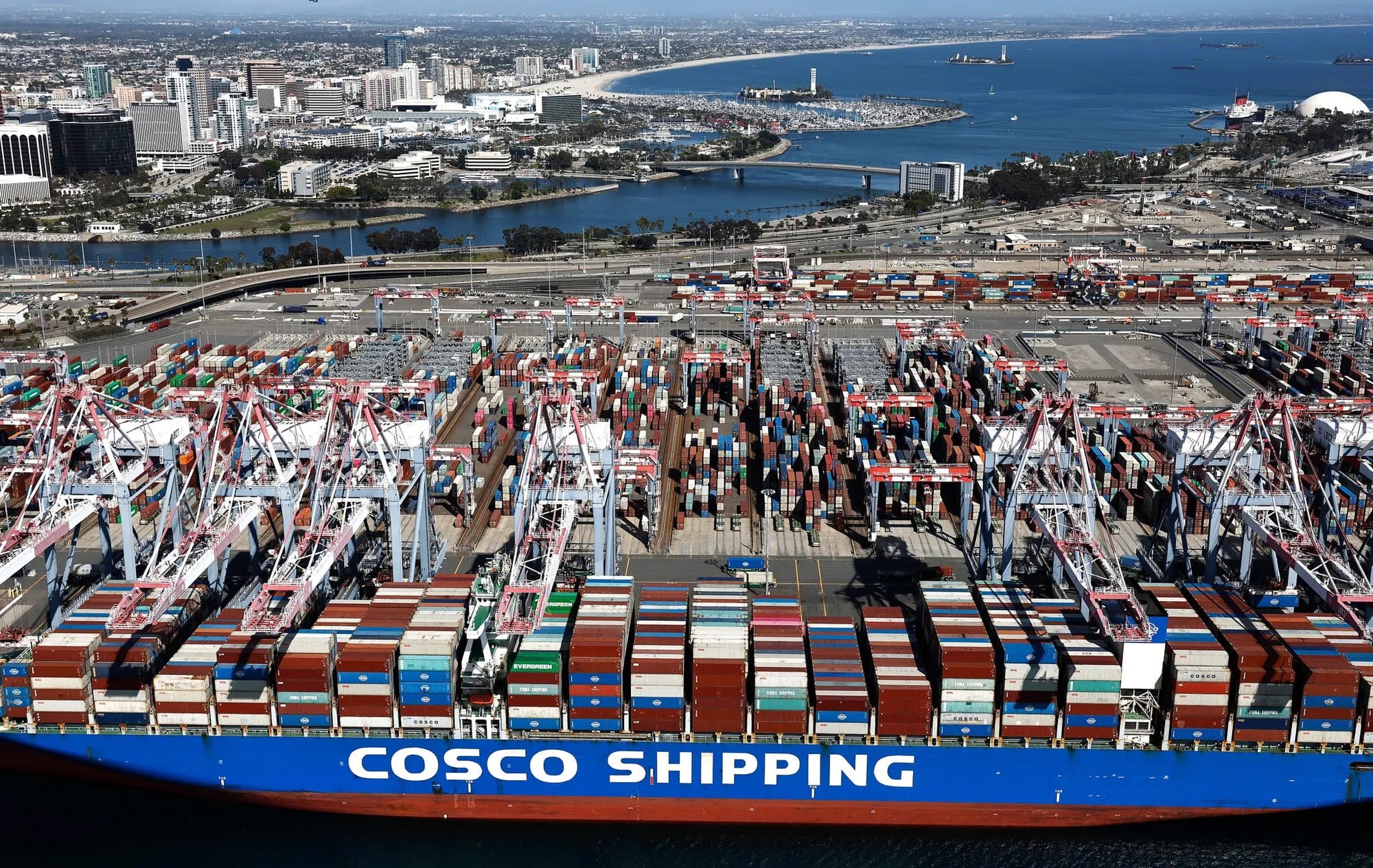April 4 2025
Global stocks drop after tariffs; China retaliates; Trump blocks loophole trade; FBI leaders seek to restore ‘brand’; Midwest apartments

Global Stocks Plummet in Wake of Trump’s Tariffs
China Matches Trump’s 34% Tariffs, Targets Rare Earths, Ag, U.S. Firms
Trump’s Tariffs Slam Shut China’s Backdoor Trade Routes
FBI Chiefs Patel and Bongino Push Reform Amid Criticism
Morgan Properties Bets Half Billion on Midwest Rent Boom
GET THE CITIZEN JOURNAL APP - FREE!

FLASH…Head of National Security Agency and Cyber Command Is Ousted…
1. Global Stocks Plummet in Wake of Trump’s Tariffs
Global stocks extended their losses on Friday after China retaliated against Donald Trump’s tariff blitz, as investors took fright at the prospect of a full-blown global trade war. The Stoxx Europe 600 index was down 4.5 per cent by late morning, with losses accelerating after Beijing’s announcement, pulling the Europe-wide benchmark into correction territory. Germany’s Dax was down 4.9 per cent. Futures markets pointed to further steep declines on Wall Street after Thursday’s rout, when the S&P 500 suffered its biggest one-day drop since 2020. S&P futures were down 2.2 per cent ahead of the New York open. Oil prices continued to fall, with Brent crude down 5.5 per cent at $66.28 a barrel. Government bond yields tumbled as investors sought haven assets, with the 10-year US Treasury falling 0.17 percentage points to 3.88 per cent. Yields on 10-year Japanese government bonds dropped 0.19 percentage points to 1.16 per cent.
Editors note: the US 10-year Treasury bill rate sets mortgage interest rates for homeowners and loan interest rates for small businesses - lower is better for average people. Perhaps the goal for a political coalition elected by Main Street, not Wall Street? See my commentary yesterday on the opposing interests of the GOP and Dems.
Source: FT
2. China Matches Trump’s 34% Tariffs, Targets Rare Earths, Ag, U.S. Firms
A. The Chinese government will match President Trump’s plan for 34 percent tariffs on goods from China with its own 34 percent tariff on imports from the United States, China’s Finance Ministry said on Friday. Separately, China’s Ministry of Commerce said it was adding 11 American companies to its list of “unreliable entities,” essentially barring them from doing business in China or with Chinese companies. The ministry imposed stringent limits on exports of certain rare earth elements that are mined almost exclusively in China and are used in everything from electric cars to smart bombs. The commerce ministry also announced it was beginning two trade investigations into American exports of medical imaging equipment — one of the few manufacturing categories in which the United States remains internationally competitive. China’s General Administration of Customs said that it would halt chicken imports from some of America’s biggest exporters of agricultural commodities. Taken together, the measures released by three different government agencies within minutes showed that China has no intention of backing down in the trade war that Mr. Trump began this week with his own steep tariffs on imports from around the world. China’s new tariffs will hit fewer goods than President Trump’s tariffs only because China sells far more to the United States than it buys. China bought $147.8 billion worth of American semiconductors, fossil fuels, agricultural goods and other products last year. It sold $426.9 billion worth of smartphones, furniture, toys and many other products.
B. The trade war comes at a sensitive moment for China’s leader, Xi Jinping, who has leaned on exports to steer the world’s second-largest economy through a property sector slump and deflation.
Source: NYT, FT
3. Trump’s Tariffs Slam Shut China’s Backdoor Trade Routes
With the tariffs that President Trump unveiled on Wednesday, he is not just closing America’s front door to Chinese exports — he is slamming the back doors shut as well. He has now piled tariffs totaling 54 percent on goods coming straight from China, on top of tariffs of up to 25 percent that he imposed on many imports from China during his first term. More significantly, his latest actions attempt to cut off a series of alternative routes for Chinese goods to reach American store shelves and households. Since Mr. Trump began imposing tariffs on goods from China seven years ago, many Chinese companies have poured billions of dollars into building industrial parks in countries like Vietnam, Cambodia, Thailand, Malaysia and Mexico. In turn, these facilities have been importing components from China, assembling them into finished goods, and shipping them to the United States. But Mr. Trump hit Mexico with extra tariffs earlier this year, and this week announced tariffs of as much as 49 percent on China’s partner countries in Southeast Asia as well.
Source: NYT
4. FBI Chiefs Patel and Bongino Push Reform Amid Criticism
Before they took control of the F.B.I., the bureau’s two top leaders, Kash Patel and Dan Bongino, were some of the agency’s most rabid critics, attacking it at every turn for years. But now that they are running the agency, the two men have pulled a kind of bait-and-switch: In recent emails to thousands of F.B.I. employees, they have sought to use the bureau’s damaged reputation — a reputation that they themselves helped tear down — as a rationale for bringing reforms to the supposedly broken organization. “Over the past few years, the F.B.I.’s reputation has been damaged in the eyes of our employers, the American people,” Mr. Patel wrote on Wednesday in one of the messages. “I know each of you, serving across this great nation, are tackling cases that will further the betterment of the communities in which you live and work.”
Source: NYT
5. Morgan Properties Bets Half Billion on Midwest Rent Boom
Morgan Properties, the country’s largest privately held apartment landlord, has agreed to pay $501 million for 11 multifamily properties across the Midwest, the latest wager that the region’s lack of supply provides fertile ground for rent hikes. Morgan has been aggressively expanding its Midwest footprint over the past several years, believing the region is primed for a mini Sunbelt-style boom. “The Sunbelt was obviously hot post-Covid,” said Morgan Properties Co-President Jonathan Morgan. “At the moment, it’s the Midwest.” Before 2019, the firm owned two Midwest properties, totaling 793 units in the region. With this latest purchase of more than 3,000 units, its regional tally is up to 14,500 units. It marks the largest deal in the multifamily sector in 2025, according to data firm CoStar. Morgan Properties and other real-estate investors are looking for places where a lack of supply is converging with new demand that will give them the pricing power to increase rents. The Midwest is among the most undersupplied regions in the country. That is partly due to developers’ fixation on faster-growing parts of the U.S. such as the Sunbelt, where people have migrated in droves.
Source: WSJ
April 4, 1968: Dr. Martin Luther King Jr. is assassinated
SUBSCRIBE ONLINE TO GET THE US CITIZEN JOURNAL IN YOUR INBOX - FREE!
See the Ad Astra Podcast! Released on Apple and Spotify around 10a CST.
Sponsors (click me!)





Sources
- https://www.ft.com/content/0147b09b-e319-453d-9a0c-e8fcce510a18
- https://www.nytimes.com/2025/04/04/business/china-trump-tariffs-retaliation.html; https://www.ft.com/content/84fe4e66-74ef-4517-8733-2c84f77ea3b7
- https://www.nytimes.com/2025/04/04/business/trump-china-tariffs.html
- https://www.nytimes.com/2025/04/04/us/politics/kash-patel-fbi-trust.html
- https://www.wsj.com/real-estate/morgan-properties-landlord-midwest-purchase-3d80ec56?mod=hp_lead_pos4
